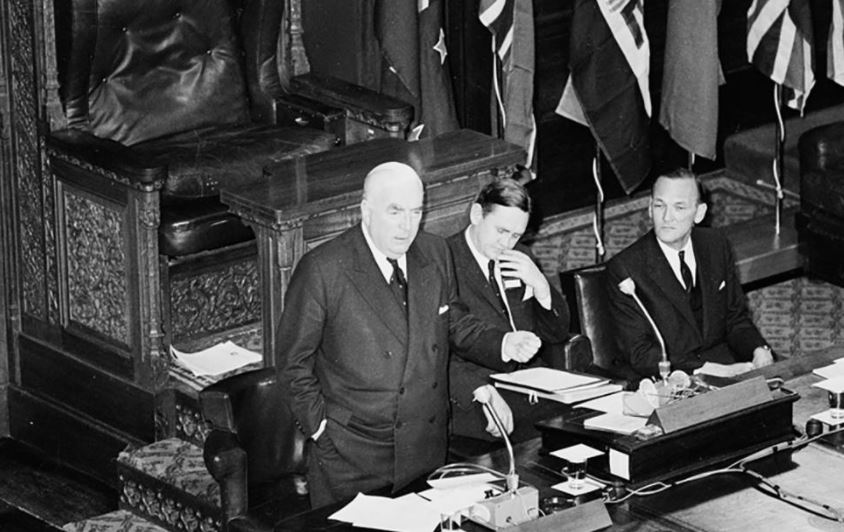
Sixty years ago this month, the first Antarctic Treaty Consultative Meeting was held in Canberra. It ran from 10 to 24 July 1961 and was attended by representatives from the 12 Antarctic claimant states: Argentina, Australia, Belgium, Chile, France, Japan, New Zealand, Norway, South Africa, the Union of Soviet Socialist Republics, the United Kingdom and the United States.
The opening speech was given by the Australian prime minister, Robert Menzies. It marked a significant milestone in Australian foreign policy and in international affairs more broadly. It also marked the beginning of longstanding Australian political bipartisanship on major Antarctic issues—the Antarctic Treaty enabling legislation was passed unanimously by both Houses of parliament.
Australia, at first a cautious participant in the negotiations that led to the signing of the Antarctic Treaty in Washington in 1959, was influential in shaping the final text. Australia’s minister for external affairs, R.G. Casey, played a key part in convincing the USSR to accept that the treaty protected the Soviets’ interests as much as it did those of the Antarctic claimant states. The treaty entered into force in 1961 and its membership has since expanded beyond the original 12 parties to include 54 nations.
Menzies referred specifically to Casey’s role in the treaty negotiations—‘Lord Casey … played a most active part in the negotiation of this Treaty’—and noted that Casey was at the time ‘in the Soviet Union having a look at the Polar Institute at Leningrad’.
The treaty made Antarctica a non-militarised zone, banned military manoeuvres and prohibited nuclear-weapons testing. It declared that the Antarctic treaty area (all the globe below 60 degrees south) was to be used for peaceful purposes only.
Menzies’ speech reflected not only the core tenets of the treaty, but also Australia’s strategic Antarctic interests.
Outlining Australia’s historical connections and proximity to the Antarctic, Menzies said:
We, of course, are a country very close to the Antarctic. We have, over a number of years, had great interests in it. We have had the pleasure of being associated with some notable work of exploration in that part of the world …
So, we have not only a sense of neighbourhood about the Antarctic; we also have, over many years, a deep and practical interest in it.
Menzies then went on to speak of the geopolitical importance of the treaty and the current meeting:
To-day there are twelve nations represented here—four of them … ‘nuclear powers’. This, I think, is tremendously significant, because the Treaty itself—and the whole spirit in which it was conceived—have concentrated round three major principles which we would do well to bear in mind. The first of these is that the region is not to be regarded as a region in which preparations for war or conflict can be engaged in. It would not, perhaps, be grammatically accurate to say that it is demilitarized, because it has never been militarized; but it is to be non-militarized …
The second thing about it is the emphasis that it places upon co-operation … [H]ere in the Antarctic, we are going to have, more and more as a result of this association between us, co-operation in scientific research … for the benefit of mankind all over the world.
The third thing is that under the Treaty we have agreed to set aside the argument about territorial claims. Nobody abandons his own. We have made territorial claims in the Antarctic—quite expansive ones. I dare say that there are nations represented here to-day who would not agree with some of our claims … [W]hen this Treaty was being negotiated it was agreed not to abandon claims but to put on one side the argument about them.
In addressing these three issues, in the language of his day, Menzies articulated the foundations of Australia’s enduring Antarctic strategic interests:
- Antarctica should be kept free of international conflict, war and aggression.
- Antarctica should be place of international collaboration in science for all of humankind.
- Australia has not abandoned its Antarctic territorial claim, but has agreed along with all other Antarctic Treaty parties that differences of view can be and are accommodated within the treaty.
In the depths of the Cold War it’s remarkable that the treaty was successfully negotiated, and more remarkable still that it has endured without major discord or conflict for 60 years.
For Australia, the Antarctic represents a strategic zone of peace to our south, and it has immeasurable value just for that fact alone. But we know, too, that Antarctica is the engine room of the global climate system, and Antarctic science is critical for our understanding of the future of our planet.
For these reasons alone, it is in Australia’s national interest to keep the Antarctic free of conflict and strife. As ASPI senior fellow Anthony Bergin and I have argued, while it’s important to understand the actions and motives of other players, it’s just as important to invest every effort to retain the norms and modes of the Antarctic Treaty System, and ensure its strength and survival.
To do this we need to invest in the tools of both hard and soft diplomacy—hard diplomacy to counter belligerent behaviours and insidious reinterpretation of the fundamentals of the Antarctic Treaty System, and soft diplomacy such as collaboration in Antarctic science and logistics as the foundations of peaceful international cooperation in the Antarctic region.
Reprising Menzies’ speech is a good reminder to all of where Australia’s Antarctic strategic investments should be directed.

